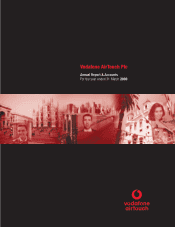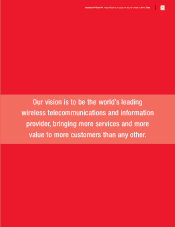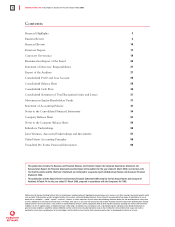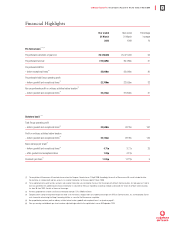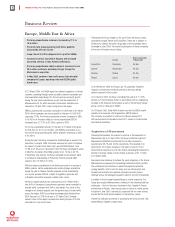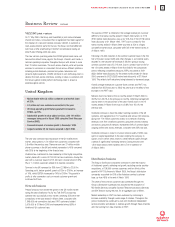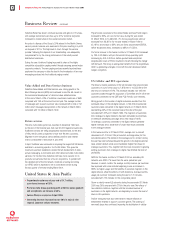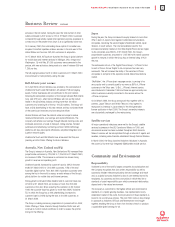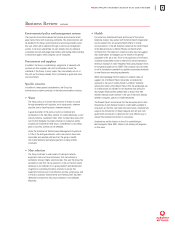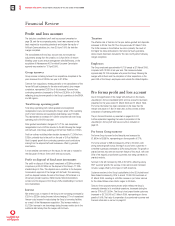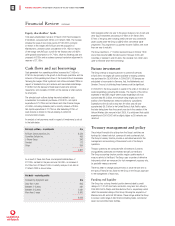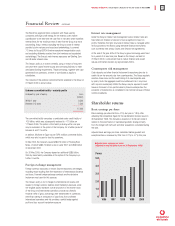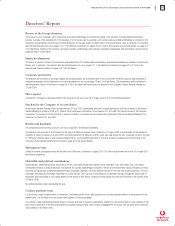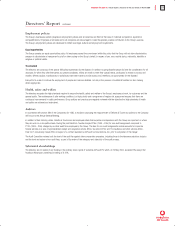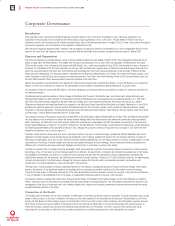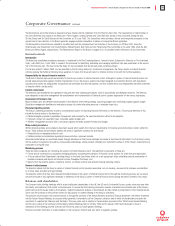Vodafone 2000 Annual Report Download - page 11
Download and view the complete annual report
Please find page 11 of the 2000 Vodafone annual report below. You can navigate through the pages in the report by either clicking on the pages listed below, or by using the keyword search tool below to find specific information within the annual report.
Vodafone AirTouch Plc Annual Report & Accounts for the year ended 31 March 2000 9
Environmental policy and management systems
The Executive Committee believes that positive environmental action
goes hand in hand with improving profitability. This interconnection will
be detailed in the Group environmental and social responsibility policy
this year, which will be delivered through a new Group management
system. It will draw substantially on work already done by individual
companies and will encourage local initiative and testing while providing
a benchmark against which progress can be measured.
Procurement and suppliers
In addition, the Group is undertaking a programme of research with
partners into how suppliers can best be influenced to meet the
standards of the Group. In many cases, they have already set out on
this path but the Group believes that in partnership a great deal more
can be achieved.
Specific concerns
In addition to these general considerations, the Group has
environmental concerns particular to the telecommunications industry.
• Waste
The Group policy is to reduce the production of waste at source
through partnership with suppliers, by re-using waste, wherever
possible, and by recycling waste, wherever practical.
A good illustration of this policy in action is Vodafone UK’s
participation in the Take Back scheme for mobile telephones, a joint
industry initiative. Launched in May 1999, its latest data shows that
over 50,000 handsets have been returned via consumer outlets,
including all Vodafone UK retail shops. Consideration is now being
given to how this scheme can be extended.
Under the Vodafone UK ‘Retired Assets Management Programme’,
5-10% of the analogue network’s radio base stations have been
dismantled and recycled with less than 2% going to landfill.
Old mobile telephone exchange equipment is being similarly
processed.
•Mast selection
The Group continues to seek means of making its network
equipment more and more unobtrusive. That commitment is
particularly strong in highly sensitive areas. This year the Group has
pioneered a mast that can be secured in a tree so that the natural
landscape is not affected. An on-going research and development
programme is providing innovative solutions to ensure that
equipment becomes ever more effective and less conspicuous; and
in the UK a specialist Environmental and Planning Team has been
developed to ensure that this issue continues to be addressed
effectively.
• Health
For some time, Vodafone AirTouch and the rest of the mobile
telephone industry has worked with the World Health Organization
and its research into any possible health effects of mobile
communications. In the UK, Vodafone welcomed the recent Report
of the Stewart Inquiry on Mobile Phones and Health which
confirmed that
‘the balance of evidence to date does not suggest
that mobile phone technologies put the health of the general
population of the UK at risk’.
Prior to the publication of the Report,
Vodafone implemented moves to meet the EU recommendations
relating to exposure to radio frequency fields using exposure limits
for the general public set by ICNIRP. The Company has committed
for all its installations operated by subsidiary companies worldwide
to meet these more exacting requirements.
Whilst acknowledging that the balance of evidence does not
suggest risk, the Stewart Report advocates a precautionary
approach to the use of mobile phones by children. Vodafone
accepts the advice of the Stewart Report that the widespread use
of mobile phones by children for non-essential calls should be
discouraged. Many parents already seek to ensure that their
children exercise proper restraint in the use of electronic devices
whether computers, games or mobile telephones.
The Stewart Report recommends that the absorption rate of radio
frequencies of each handset model be made readily available to
consumers so that they can make informed choices. Vodafone fully
supports the introduction of these measures and will work with
government and industry to determine the most effective way to
present this technical information to consumers.
Vodafone has led the industry in the UK in establishing an
electromagnetic fields (EMF) advisory unit dealing with enquiries
on this issue.
Business Review continued

